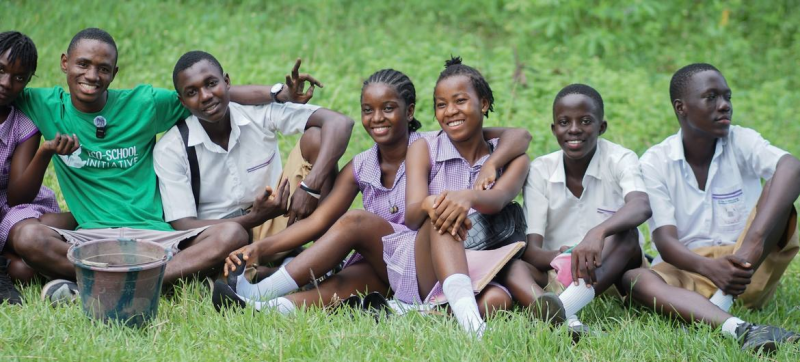- Dhaka residents struggling with ‘unhealthy’ air quality |
- Over 100 Killed in Brazil’s Deadliest Rio Police Raid |
- Alphabet Tops $100 Billion Quarter as AI Drives Surge |
- Wild bird meat raid in Sylhet’s Jaintiapur: 2 hotels sealed, 1 fined |
- Reported massacre at hospital in Sudan’s El Fasher leaves 460 dead |
World Leaders Gather in Doha to Renew Social Development Pact

In Sierra Leone, young farmer and climate advocate Michael Nabieu (green t-shirt, second from the left) empowers students to turn waste into opportunity – advancing the spirit of social inclusion and sustainable development.
What does it mean to build a society where everyone truly belongs? In a world increasingly shaped by digital divides, demographic shifts, and climate disruption, the promise of “social development for all” feels urgent, if elusive.
Yet the idea that development should be people-centred, inclusive, and just is far from new. It’s a vision the world committed to 30 years ago at a UN summit in Copenhagen and one that still resonates today.
Next week, leaders from across the globe will gather in Doha, Qatar, for a high-level UN conference aimed at reigniting that vision. From 4 to 6 November, the Second World Summit for Social Development will convene Heads of State, ministers, civil society representatives, and experts to assess progress, confront persistent gaps, and chart a renewed path forward.
At its heart lies a simple but powerful question: how can we ensure that no one is left behind?
“The Summit comes at a critical moment,” said Li Junhua, UN Under-Secretary-General for Economic and Social Affairs.
He explained: “Inequalities are widening. Trust is eroding. Communities are struggling with conflict, climate shocks, and rapid technological change. And yet, we also see extraordinary innovation, resilience, and solidarity. This is our chance to rebuild trust between governments and their people—and among nations.”
A Global Call to Action
Bjørg Sandkjær, UN Assistant Secretary-General for Economic and Social Affairs, said the Summit represents a “global call to action” at a time when more than one billion people still live in complex poverty, and 40 per cent of the world’s population lacks access to social protection.
The meeting, she told UN News, is about renewing trust in collective progress—“trust that we can make a difference.”
The gathering follows months of intergovernmental negotiations in New York that culminated in agreement on the Doha Political Declaration, expected to be formally adopted at the opening session.
The Declaration is at the heart of the Summit, emphasised Alya Ahmed Saif Al-Thani, Ambassador and Permanent Representative of Qatar to the UN.
“It is a global call to action, recommitting governments to creating an enabling economic, political, social, cultural, and legal environment to achieve social development for all,” she said.
A Pivotal Moment
With just five years left to achieve the Sustainable Development Goals (SDGs) by 2030, the world is lagging badly on many fronts. Progress in reducing poverty has slowed, gender equality has stalled, and many young people face precarious futures.
Last year, when Member States called for this Summit, they sent a clear message: social development must once again take centre stage, explained ASG Sandkjær.
It is about recommitting to the core of the 2030 Agenda and ensuring that no one is left behind.
Dynamic and Inclusive
Alongside the official plenaries, a parallel programme will add a participatory and forward-looking dimension to the Summit.
A Civil Society Forum, Private Sector Forum, and interactive Solutions Square will spotlight innovations in employment, social protection, and community resilience. Youth and academic networks will take centre stage, embodying a spirit of co-creation and shared responsibility.
A new Doha Solutions Platform for Social Development, jointly launched by the host Qatar and France, will spotlight real-world commitments and new initiatives—from policy reforms to partnerships addressing poverty, work, and inclusion.
“Doha once again stands as a symbol of global solidarity, where commitments inspire actions, partnerships drive progress, and the shared vision of an inclusive, sustainable, and peaceful future for all comes to life,” said Ambassador Al-Thani.
Coming Full Circle
For Ms Sandkjær, who attended the first World Summit in Copenhagen in 1995 as a young activist, Doha represents both continuity and change. Back then, she recalled, there was great optimism—a belief that multilateralism and cooperation would keep advancing.
“Today’s young people face tougher challenges—misinformation, climate anxiety, distrust,” she said. “But my message to them is simple: your engagement matters. Raise your voice, form partnerships, push for action.”
From Words to Action
The Summit’s success will not be measured by speeches but by implementation, she emphasised.
With a strong declaration and partnerships already in place, “the real test,” she said, “is translating commitments into real improvements in people’s lives—decent jobs, social protection, inclusion. That’s how we’ll know we’ve succeeded.”
As world leaders gather in Doha, expectations are high—and so is the sense of urgency. Thirty years after Copenhagen, the task remains the same: to build a world where progress is measured not only in wealth, but in well-being, equality, and human dignity.
UN News will report live from Doha throughout the Summit, bringing stories, interviews, and insights from world leaders, youth activists, civil society, and innovators driving change.
Follow the coverage across digital and social platforms for real-time updates and human stories from this milestone gathering for social development.

